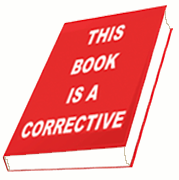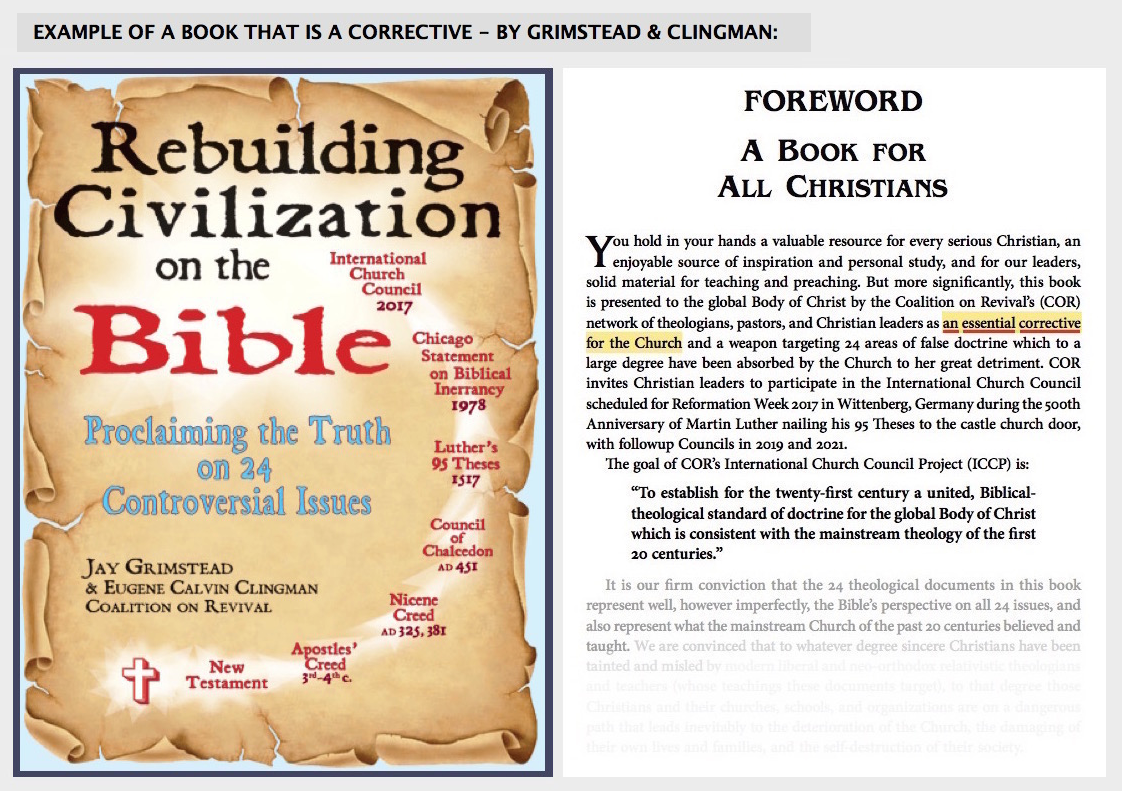
WHAT IS "A CORRECTIVE"?
Observe the usage of "a corrective" in sentences:
Jonathan Master, PhD., professor of theology and dean of the School of Divinity at Cairn University and executive editor of Place for Truth and co-chair of the Princeton Regional Conference on Reformed Theology, in an article on biblical and systematic theology, said, "There are errors to which we are liable in the formulation of systems - errors for which biblical theology offers A CORRECTIVE."
In Craig G. Bartholomew's Introducing Biblical Hermeneutics, while discussing textual criticism, he makes reference to another Christian writer's treatment of the account of Mary and Martha in Luke 10 as "A CORRECTIVE for those who only analyze the text."
In A Biblical-Theological Introduction to the New Testament, Michael J. Kruger discusses the concept held by some, of "biblical theology as A CORRECTIVE to systematic theology."
Errol R. Wagner wrote "A critique of Jay E. Adams' theology" in which Wagner bluntly states, "What Adams needs is A CORRECTIVE" in a certain area."
IFCA International (International Fellowship of Christian Assemblies International) is strict "Fundamentalist," cessationist (non-charismatic, et al) in doctrine and practice. As with all of the above-quoted sources, we here quote them, not out of agreement with them theologically, but only for their "usage" in the English language of the term "corrective" and application of it to Christian writings, in the following:
Les Lofquist, IFCA International Executive Director, wrote a statement on behalf of their fellowship, titled (your close attention, please) "Leadership Abuses and the Biblical CORRECTIVE." In this CORRECTIVE Lofquist observes the glaring differences between many present day church "pastors" and what the Bible refers to as "shepherds." In other words, many "pastors" are not good biblical "shepherds." And notice this admonishment or rebuke to such falls under the heading of "Leadership Abuses," and is termed a "CORRECTIVE." Lofquist calls on Christians to "restore" the biblical concept. He says that "God's plan for loving ministry" "provides A CORRECTIVE to the abuses so prevalent in CHURCHES today." Says Lofquist, true shepherds are not to act as "managers" nor "executives, policy makers, ... nor CEOs." Lofquist asserts, "The Master's master principle for shepherding leadership was given in Matthew 20:25-28." This well known passage reads as follows: "Jesus called them unto him, and said, Ye know that the princes of the Gentiles exercise DOMINION over them, and they that are great exercise AUTHORITY upon them. But it shall NOT be so among you: but whosoever will be great among you, let him be your diakonos (servant); And whosoever will be chief among you, let him be your doulos (slave): Even as the Son of man came not to be served, but to serve, and to give his life a ransom for many." A minister aiming thus to "serve" rather than to "rule" has, in our day, been dubbed the "servant model" of ministry. So Lofquist is on that wavelength in this CORRECTIVE. Speaking of that model, Lofquist says, "Unfortunately many churches forget this priority." And he says, "Even the great Old Testament leader is referred to as 'Moses my servant' not 'Moses my ruler.' Christ was a servant leader. His shepherds are to be the same." Lofquist sets forth (as does the Bible) Jesus Christ the "good shepherd" as the model for all would-be under-shepherds, and says, "The unloving, harsh pastor who callously uses people to accomplish his own agenda has no parallel in the life of a good shepherd." Lofquist points to Ezekiel 34 where God rebuked the shepherds of the people in Ezekiel's day "for these very actions," saying "with force and cruelty you have ruled" them. Lofquist says "That entire chapter, Ezekiel 34, is a contrast between self-seeking shepherd leaders and the righteous shepherd." He wrote, "My Old Testament seminary professor Dr. John Davis questioned a modern Palestinian shepherd about the attitudes required for a good shepherd. Dr. Davis wrote, 'This shepherd constantly mentioned the fact that the best shepherds are those who genuinely LOVE their sheep.'" Plainly "genuine love" is contrasted sharply against "ruling" by "dominion" and raw ostensible "authority." Put simply, exercising dominion is not love. Lofquist cites 1 Peter 5:2-3 in the NKJV, "Shepherd the flock of God which is among you, SERVING as overseers, ... not for dishonest gain ... nor as being LORDS OVER those entrusted to you, but by being EXAMPLES to the flock." But, do not MISS what our point here is: It is that Lofquist has titled this entire admonition a "Biblical CORRECTIVE" to "leadership abuses."
A CORRECTIVE.
My whole objective just here is for you simply to understand this TERMINOLOGY, that is, to rightly and clearly understand when we say that this or that is written as "A CORRECTIVE" or when we say something like "This book is A CORRECTIVE to errors in Christendom." It is a common term for this kind of written material. And such undertakings are likewise common in Christendom. We do not think that we presume. We take no more upon us than Les Lofquist above. We hope we've made it plain that "correctives" are an entire "genre" of Christian writing undertaken commonly by countless Christian writers. One need not have a halo brighter than everyone else's or first walk on water or first be transfigured and shine brighter than the sun before he can write a "corrective." Rather, at issue is whether the body of Christ indeed has such a problem as a corrective can address, and whether the corrective is truth. It is a matter of truth.
NEXT SECTION:
When I refer to a book as a "corrective":
We often refer to a certain kind of book as a "corrective," that is, using "corrective" as a noun. In sentences, we might say, "This book is a corrective," or "We have written a corrective, a book on that matter."
Below are some examples of this use of "corrective" as a noun in common usage. I repeat, I intend no approval of any of their doctrinal beliefs or their thoughts or opinions. It is doubtful I have even read them. I simply make use of the published titles of their works for the sake of how the term "a corrective" is used by them. Occasional use of ALL CAPS is my own for emphasis:

Rodney Stark wrote the book "God's Battalions: The Case for the Crusades." It is A CORRECTIVE to revised history. In "With Christian Eyes" Victoria Priest writes a book review on it, rightly titled, "God's Battalions: A CORRECTIVE to Revisionist Crusades History." We think that Christianity today would be well served if more Christians recognized a "corrective" book when they hold one in their hands. The "genre" needs to be recognized.
Elmer A. Martens of the Mennonite Brethren wrote a corrective. It was titled "Psalm 73: A CORRECTIVE to a Modern Misunderstanding."
Christian writer Rodger C. Young (Andrews University Seminary) wrote "Ezekiel 40:1 as A CORRECTIVE for seven wrong ideas in biblical interpretation."
Philip A. McClendon (Southern Baptist Theological Seminary) published a piece titled "Galatians 2:20 as A CORRECTIVE to Selected Contemporary Views of Christian Spirituality."
In an address to the Alliance of Confessing Evangelicals Paul Helm wrote A CORRECTIVE to certain misconceptions some have about the Reformed theologian Charles Hodge. It was titled "Charles Hodge and the Method of Systematic Theology: A CORRECTIVE."
Vanderbilt biblical scholar Amy-Jill Levine wrote "Short Stories by Jesus," and said concerning the book, "Some of my chapters serve as A CORRECTIVE to the interpretations made by CLERGY who know little or nothing about early Judaism." Levine interestingly names "CLERGY" as the objects of her correctives. Perhaps more writers of correctives should be as specific. Ordinarily instead of directed to clergy we find correctives directed at unbiblical theological notions without mention of the "clergy" guilty of them, or we will hear individuals cited as being in error, but only by their name and as a promulgator of whatever error, again without mention that they are "clergy." We would point out that specifying "clergy" is beneficial in that it better narrows things down to preachers in the "pulpits" of churches, whereas not so specifying leaves the matter open: the corrective could be aimed at authors of books or even internet bloggers or academics, professors in seminaries. But there is a whole swathe of Christendom that obtains rather from "clergy in pulpits," i.e. pastors and preachers, whatever beliefs they may be that need a corrective. Levine seems to have such particularly in view.

CORRECTIVES AS PROPHETIC:
Lastly (as to, specifically, books of this "genre"), we appreciate a well known contemporary Christian book publisher's mention together of books that are "correctives" with the concern to exercise what they term a "PROPHETIC" ministry to the body of Christ:
InterVarsity Press has published IVP's "Publishing Philosophy," which states in part, "Within the bounds of the InterVarsity basis of faith ... the editorial department of InterVarsity Press seeks to acquire, develop, and PRODUCE PRODUCTS (i.e. books etc) that (among other stated things) ... Develop People in Christlikeness and ... Have Integrity and ... Are Responsibly Biblical. Every manuscript must respect the authority of Scripture, be consistent with a biblical worldview, and be soundly defensible from Scripture. ... The Bible remains our standard. ... and which ARE PROPHETIC." Under this heading (of books that "ARE PROPHETIC") it says, "There will be occasions when CHRISTIANS WILL NEED TO SPEAK A CORRECTIVE BIBLICAL WORD to society or TO THE CHURCH at large ... keeping in mind both Paul's mandate to speak the truth in love and the fact that our publications or InterVarsity Press itself is NOT ABOVE CORRECTION from the body." We think that all of that is well put: Neither "InterVarsity Press itself" nor "THE CHURCH at large" are "ABOVE CORRECTION from the body." But perhaps more pertinently to what we've noted, IVP calls "PROPHETIC" this "genre" of Christian books that constitutes "CORRECTION from the body" of Christ, and which we, in this presentation, have simply called "CORRECTIVES." It is gratifying to us to see that IVP understands that PROPHETS sent by God in all ages have sometimes brought "A CORRECTIVE BIBLICAL WORD to" God's people, and, stated differently, that the CORRECTIVE WORD is "PROPHETIC" or comes under the heading of the "PROPHETIC." Here is not the place for us to expound this principle, but let us just say it is in keeping with our own thought. We "couldn't have said it better."
As a final aside, perhaps we can augment what InterVarsity Press has said about books that are correctives to the Church being "prophetic": We would point out the ridiculously obvious: God Himself has provided us examples of this very thing, and they've been right under our noses, literally, all along: The books of the Bible. The Bible itself is "a" book. And we are all accustomed to regularly hearing reference to "the 66 'BOOKS' of the 'Bible'" or to "the 39 BOOKS of the Old Testament" or "the 27 BOOKS of the New Testament." Well friend, the Lord God has sent us His Word in the form of "books," and they are prophetic and were given us through the instrumentality of prophets. InterVarsity Press quoted just above here seems a little shy and apologetic in speaking of their producing good, biblical, scriptural books that are prophetic, books that are corrective to the Church. Well there's nothing to be timid about; Such prophetic corrective instruments (books) ought to feel "right as rain" to God's people! We hold in our hands daily 66 prophetic books that are correctives to the people of God. Prophetic correctives written and bound as "books" should strike us as the "way" God has done this for thousands of years! God said to Moses, Write this "in a book" (Ex. 17:14). And so with Samuel: It says he "wrote it in a book" (1 Sam. 10:25). Let me quote Job: "Oh that my words were now written! oh that they were printed in a book!" (Job 19:23). God told the prophet Jeremiah, "Write thee all the words that I have spoken unto thee in a book" (Jer. 30:2). And the Lord told John, in Revelation, "What thou seest, write in a book." And the Lord calls the Revelation "the words of the book of this prophecy" (Rev. 22:19). "Correctives!" Prophetic correctives! Read Revelation, chapters 2 and 3! Church after church is "corrected" by "the words of the book of this prophecy"! God says, "As many as I love, I rebuke and chasten: be zealous therefore, and repent!" "Rebuke" is the Greek elegcho, to reprove, to refute, to admonish, or to tell someone their faults. In Matthew 18:15 elegcho is in fact translated by the phrase "tell him his fault" referring to one Christian communicating his grievance to another. We are told to "elegcho" our fellow Christian if they need it. But I have been focusing on correctives when they are "prophetic": Do you know that the prophetic giftings in the body of Christ perform "elegcho"? You might have missed it because of the archaic English of the King James Version, which uses the archaic word "convince" where it's elegcho. In 1 Cor. 14:24 Paul is teaching on prophecy, and says, "If all prophesy, and there come in one that believeth not, or one unlearned, he is convinced of all, he is judged of all." That's the KJV. But it says "he is elegcho of all, he is judged of all." "He is 'elegchoed'" if I may. The RSV says "he is reproved" (corrected). The NLT puts it, that he will "be convicted of sin and judged by what you say" (in prophecy). Reproved and judged is the Greek elegcho and anakrino. It's saying that by your prophecies he is elegcho, reproved, TOLD HIS FAULTS, CORRECTED, and anakrino, discerned, examined, and convicted. Just here is not the place to discuss the prophetic gifts, but no, I am not saying that 1 Cor. 14:24 is saying to go prophesying people's "faults" against them. Don't take off on that. But my focus here is on "correctives," and I'm just pointing out that Paul says that upon hearing prophecy, a person can be elegcho, "corrected." There is of course such a thing as flat out "corrective prophecy." It's all through Scripture. Just look at the prophet Nathan saying to King David, "Thou art the man"! But here I've merely been "supporting" the "thinking" in the InterVarsity Press book "Publishing Philosophy" shared above, to the effect that it is often "prophetic" to bring "correctives" to the Church. And I'm appreciative that they can see that BOOKS are often the MEANS by which that is accomplished.
I hope that this short "treatise" helps you "appreciate" the existence of, and the role of, these kinds of, or, this genre of, "books" and "written materials" as CORRECTIVES to the Church.
I hope you can take up this language into your own vocabulary, so that it will be natural for you to refer to some particular book or written work as "A CORRECTIVE."
TO MAIN ENTRANCE PAGE
TO SITEMAP



